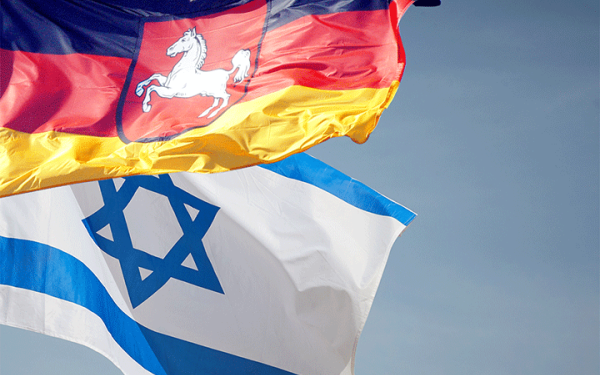Research as a Bridge: Lower Saxony Celebrates Its Partnership With Israel
#Global Engagement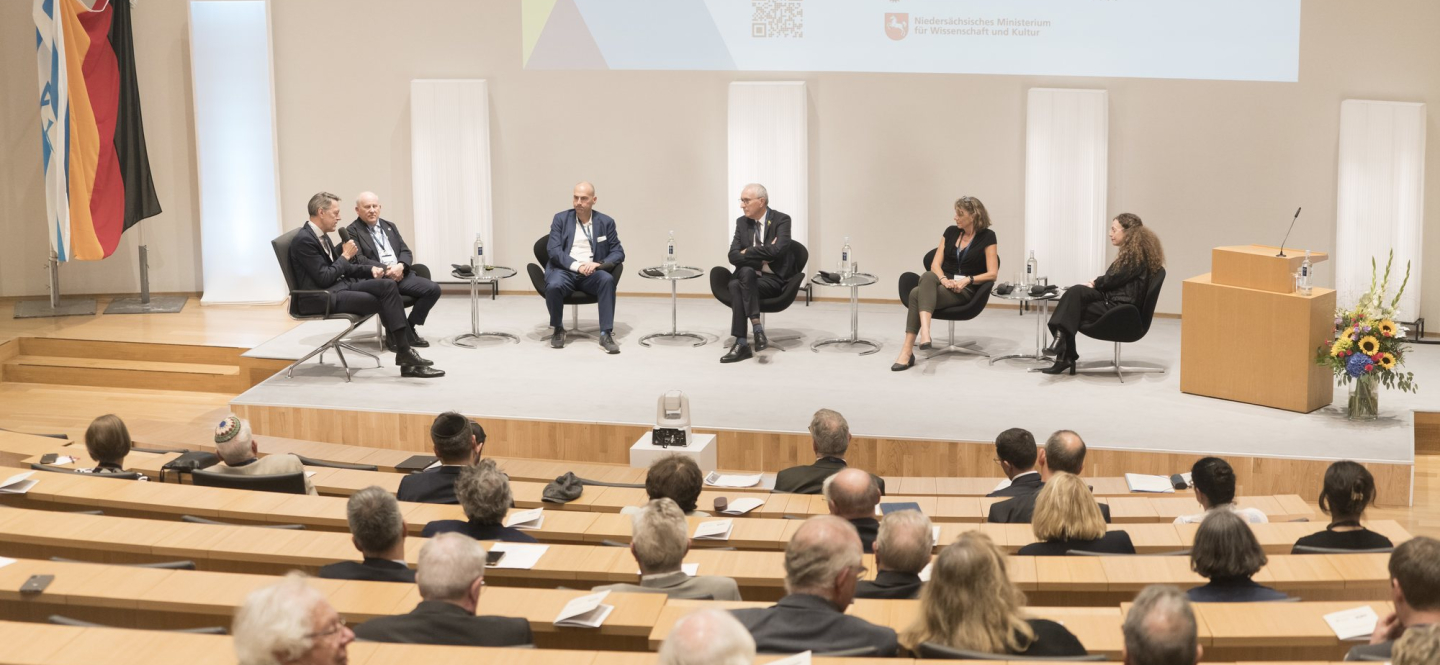
Christian Burkert für VolkswagenStiftung
At the end of the event, Georg Schütte (Volkswagen Foundation), Noam Adir (Technion), Thomas Thum (entrepreneur), Menahem Ben-Sasson (Hebrew University), Denise Hilfiker-Kleiner (Hanover Medical School) and moderator Shelly Kupferberg (from left to right) discussed the prospects for German-Israeli scientific cooperation.
Sixty years ago, a unique scientific collaboration began between Germany and Israel. A ceremony at Herrenhausen Palace on 15 September celebrated this engine of innovation and mutual understanding – as well as the 100th anniversary of two leading Israeli universities.
It was a look back to the future. An event entitled 'Bridges of Knowledge' held at Herrenhausen Palace on 15 September celebrated 60 years of 'knowledge bridges' between Germany and Israel. The focus was also on the particularly close ties with Lower Saxony as a centre of research – and the 100th anniversary of the Technion in Haifa and the Hebrew University in Jerusalem.
Falko Mohrs, Lower Saxony's Minister of Science and Culture, called Israel a scientific partner and a true friend: 'Out of the shadows of the past, a close relationship has developed that has now existed for six decades and has produced countless joint ideas and innovations.' Another deep shadow was cast over Israel by the atrocities of 7 October almost two years ago. Mohrs has since visited Israel twice. Lower Saxony decided to deepen and expand the cooperation. 'For us, it is clear that this partnership has a future – it remains a cornerstone of our international scientific relations.'
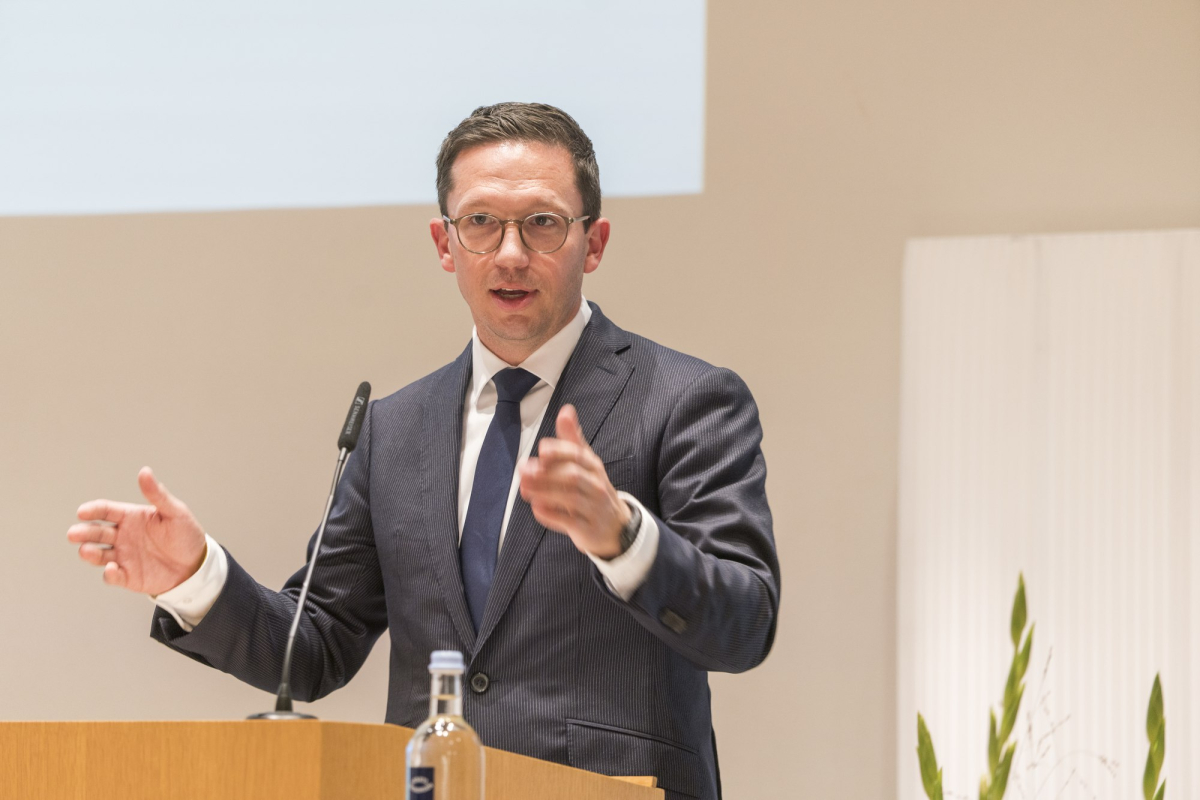
In his welcoming address, Lower Saxony's Minister of Science Falko Mohrs praised the more than six decades of relations between Lower Saxony and Israel.
Science as a bridge builder
There were also anti-Israel protests surrounding this event. Georg Schütte, Chairman of the Volkswagen Foundation, indirectly referred to this in his welcoming address: 'Political issues should be resolved on the political stage. Our task is to maintain spaces for open dialogue.' This is because science can help to find a basis for solutions and build bridges.
The bridge between researchers in Germany and Israel was built as early as 1963. Even before the official establishment of diplomatic relations, the Volkswagen Foundation approved substantial funding for Israeli research institutes. Since 1977, the funding line 'Research Cooperation Lower Saxony – Israel' has also been part of the programme zukunft.niedersachsen. The projects funded range from the humanities to the life sciences to the natural sciences and engineering.
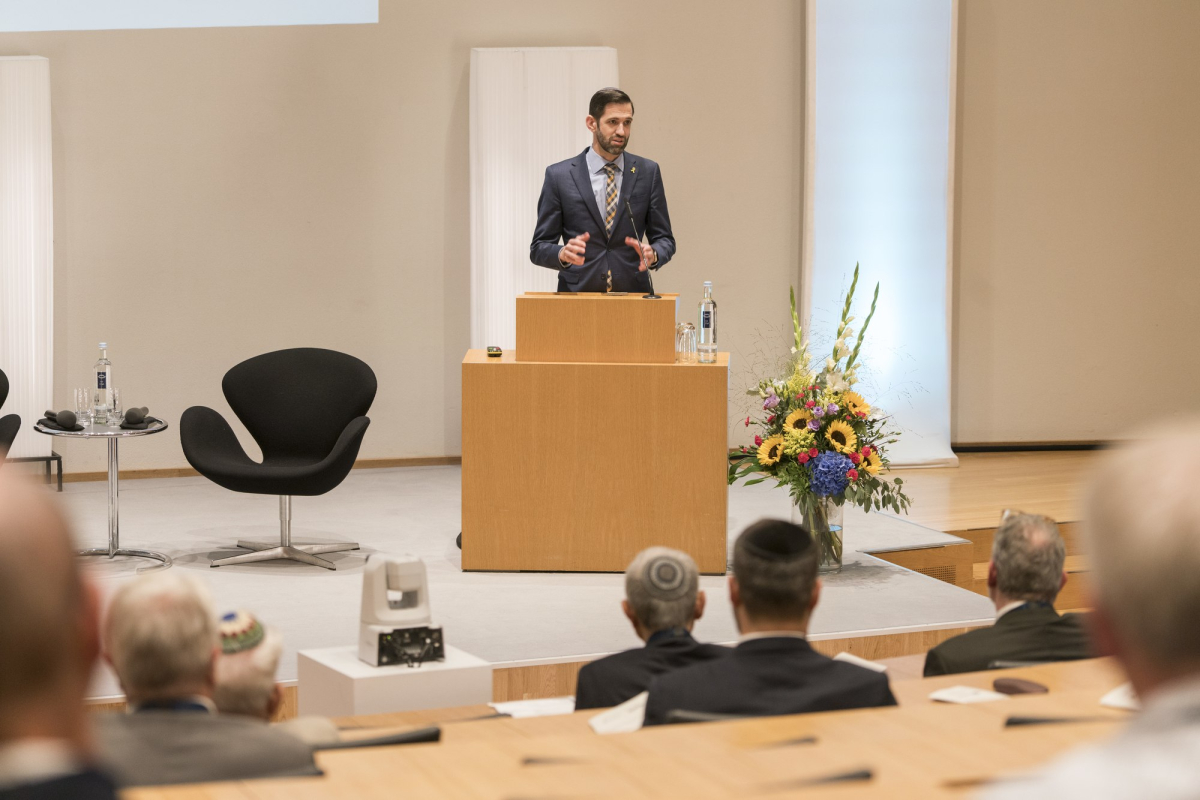
Michael Baror is responsible for the 'Science and Economy' department at the Israeli Embassy in Berlin.
The importance of science for Israel cannot be overstated, said Michael Baror, head of the 'Science and Economy' department at the Israeli Embassy in Berlin. He described the ceremony as a hopeful moment in challenging times. And he emphasised: 'These two universities were founded because their founders were convinced that a state is only complete with universities, with science and research.'
First the universities, then the state
Noam Adir, Vice President for Research at the Technion in Haifa, explained the milestones of his university. The first ideas emerged in Berlin at the beginning of the 20th century, and today it is a centre of international cutting-edge research with more than 15,000 students. Adir, a chemist, was particularly proud of the four Nobel Prize winners in chemistry that Technion has produced. The institution is one of the 100 best universities in the world and has opened branches in Guangdong (China) and New York (USA).
Menahem Ben-Sasson, Chancellor of the Hebrew University in Jerusalem, also looked back on the history of the university's founding in his lecture. At the first Zionist Congress in Basel in 1897, Heidelberg scientist Hermann Schapiro had already demanded: 'We must start with education.' Ben-Sasson spoke of discussions in Berlin at the beginning of the 20th century and of Albert Einstein, who travelled to the USA to raise funds. He praised the entrepreneurial spirit at Israeli universities. He added: 'We are not only the start-up nation, we are a nation of science. And our universities were the start-up for the start-up nation.'
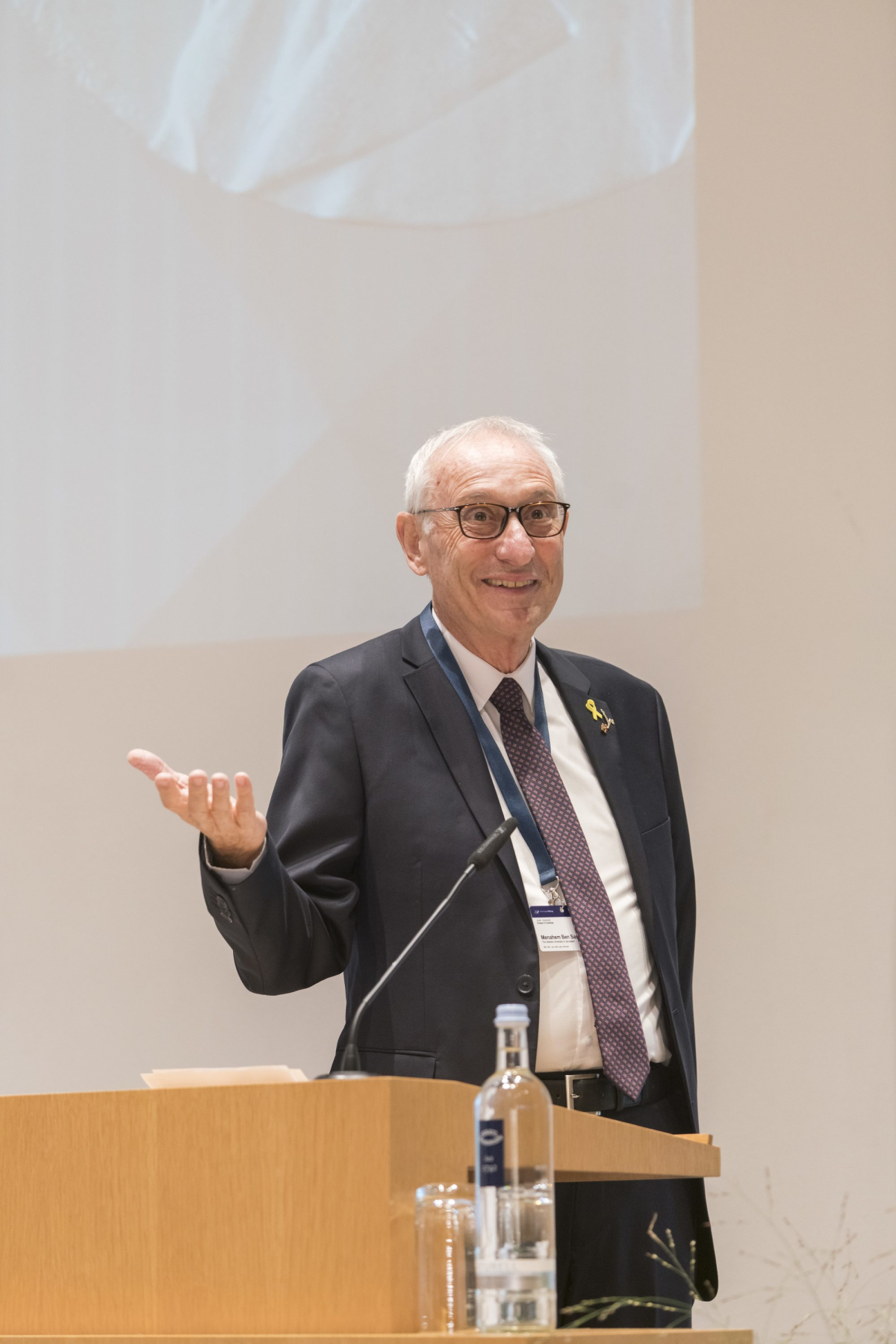
'We are not only the start-up nation, we are a nation of science. And our universities were the start-up for the start-up nation,' said Ben-Sasson, Chancellor of the Hebrew University.
An email leads to a research friendship
But what does such collaboration between researchers from Germany and Israel look like? Armin Feldhoff from Leibniz University Hannover and Meirav Mann-Lahav from Technion in Haifa reported on this during the first panel discussion of the evening. The chemist from Israel was looking for a research partner, found Feldhoff's work at the Institute of Physical Chemistry and Electrochemistry during her research, wrote an email – and shortly afterwards they were sitting together in a meeting room in Hannover's Nordstadt district. One email led to years of projects investigating the thermoelectric properties of materials such as calcium cobalt oxide and improving material transport in ceramic membranes. This has resulted in six joint publications.
'We were able to develop things that no one could have done alone,' said Feldhoff. But of course, it's not a sure-fire success. Trust, patience and resilience – these are the attributes that the two researchers identified as being necessary for such collaboration, in addition to knowledge and funding.
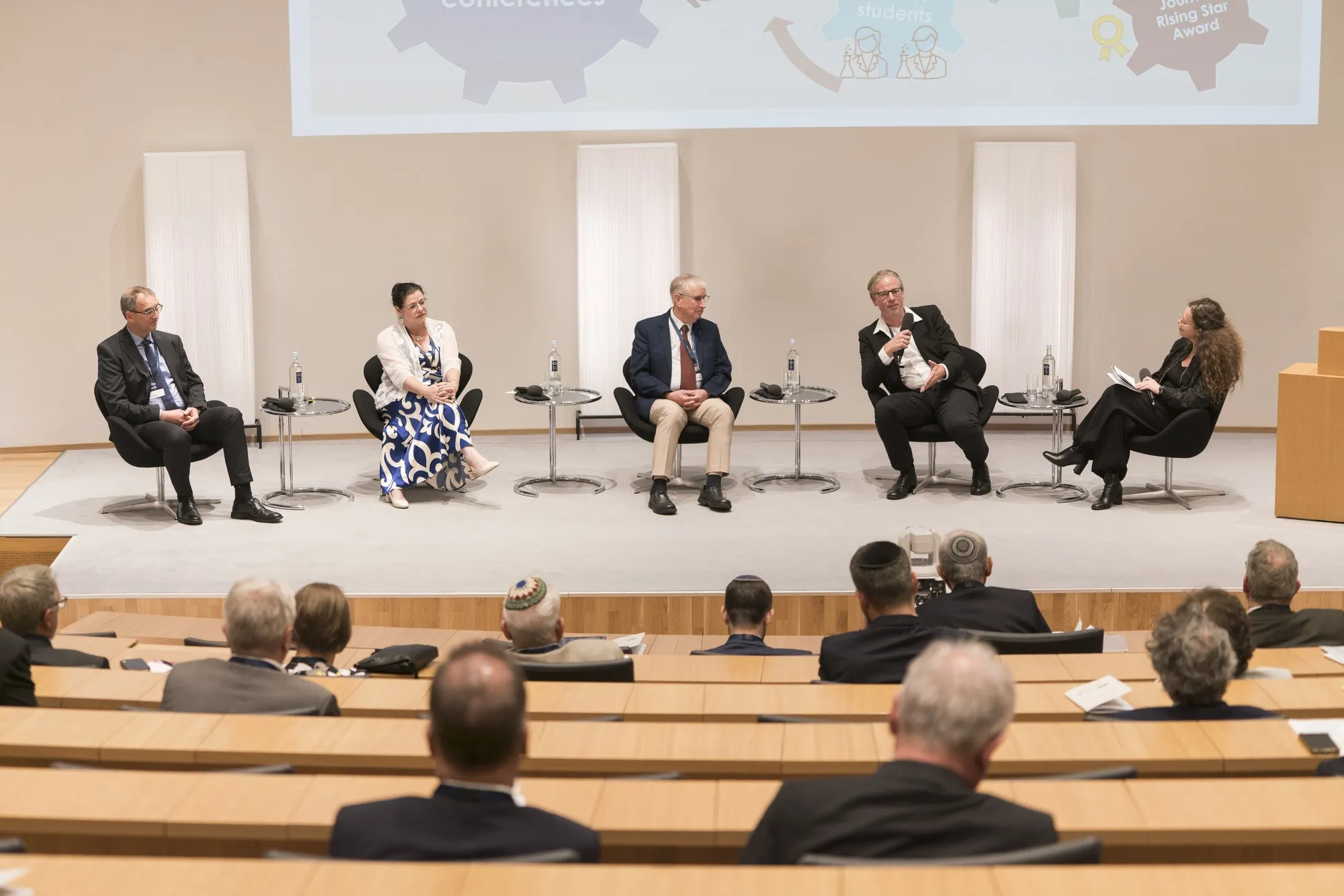
Discussing the opportunities and challenges of collaborative projects: Armin Feldhoff, Meirav Mann-Lahav, Shimshon Belkin, Timur Sevincer and moderator Shelly Kupferberg (from left to right).
As an environmental microbiologist at the Hebrew University, Shimshon Belkin can look back on decades of cooperation. 'I have worked on many topics in my career. If there is one thing that has remained constant, it is my collaboration with German researchers.' Belkin's focus is on biosensors. Genetically modified microorganisms can be used to detect pollutants, for example. But research is of little value without the equipment to make it applicable. And this is where cooperation with German universities comes into play: 'The Israelis do biology, the Germans provide the technology,' said Belkin. The formula for success? Mutual interest in the project, respect and sufficient funding. 'Then friendships quickly develop, and that leads to further research.'
A project against prejudice
The topics of scientific cooperation are by no means limited to the STEM field. Psychologist Timur Sevincer from Leuphana University Lüneburg reported on the panel how an idea became a project funded by the ministry and the Volkswagen Foundation. Under his leadership, an international research team is dedicated to the Israeli-Palestinian conflict.
In this project in the field of intervention psychology, researchers from the University of Jerusalem, Humboldt University Berlin and the University of California are working together on the complex dynamics of the conflict and aim to develop approaches for de-escalation and improved communication. 'I presented the project at an event with students and asked who wanted to participate,' said Sevincer. An Iranian student immediately volunteered and accompanied Sevincer to the anniversary event. In addition, a student with Palestinian roots is working on the project whose grandfather had to flee from what is now Israel during the Israeli War of Independence.
Research as a social act
Research is always a glimpse into the future. The second panel discussion that followed focused on the 'perspectives and prospects of German-Israeli research cooperation'. Ben-Sasson from the Hebrew University of Jerusalem described Germany as the 'closest neighbour' in research. 'I have spent years trying to convince others that Germany is closer than the west coast of the United States,' said Ben-Sasson, laughing. He appealed to those responsible, including in other federal states, saying that there are wonderful examples, such as the research cooperation between Lower Saxony and Israel. 'You are welcome to copy and paste,' he said with a smile.
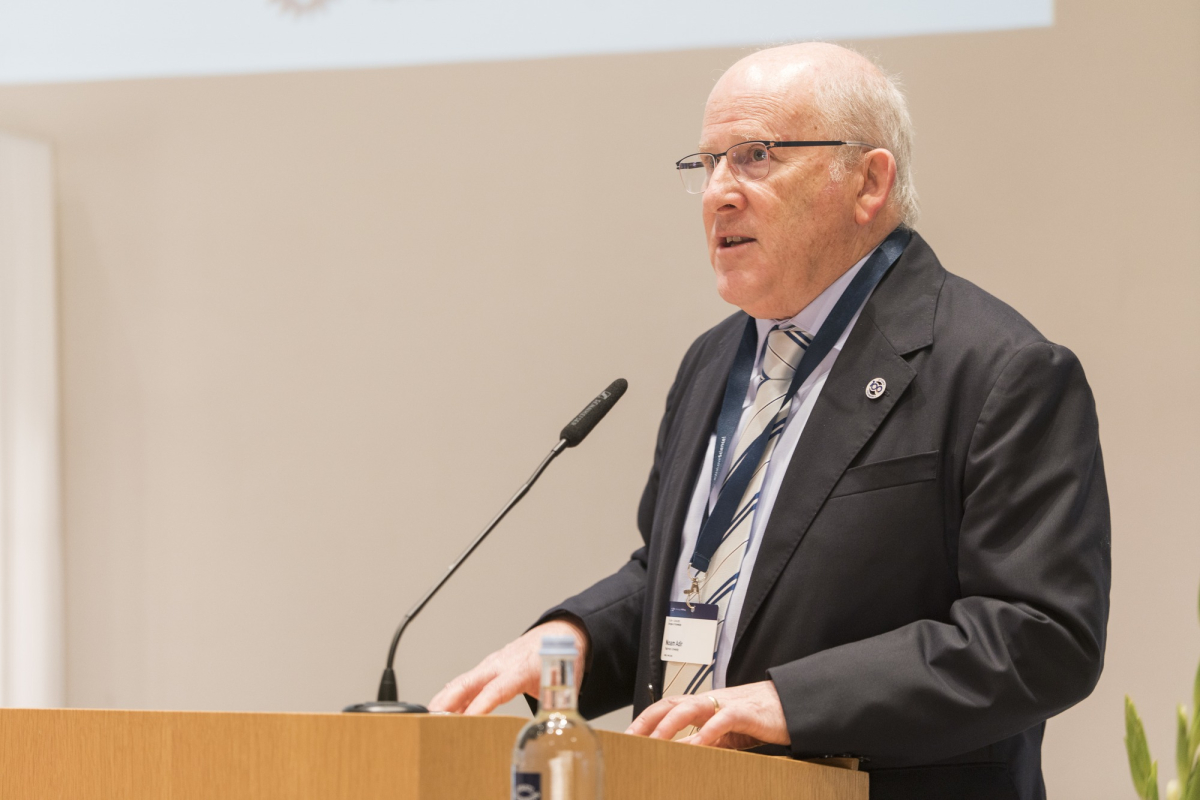
Adir is Vice President for Research at the Technion in Haifa. He first gave a keynote speech and later participated in the concluding panel discussion.
His neighbour on the podium nodded in agreement. Denise Hilfiker-Kleiner, President of the Hannover Medical School, had enjoyed a very good scientific cooperation with the Technion for many years. Thomas Thum was there himself. He is the founder and managing director of CardioR, a company that specialises in the discovery and development of therapies that use RNA to prevent, repair and reverse heart disease. 'I think student exchange is one of the keys to future success,' said Thum. The researcher and entrepreneur was particularly impressed by the number and quality of spin-offs at Israeli universities. Thum: 'We can learn a lot from this entrepreneurial spirit.'
At the end of the evening, Adir from Technion talked about how his colleagues work together in the laboratory on a daily basis, even though they could do some of the work at home or alone. Adir: 'We humans are social beings – we want to work together.' Adir also advocated a differentiated view for better cooperation. 'It would certainly be exciting for many here in Germany to see how many discussions we have at Israeli universities. These discussions are open. We are happy to be criticised.'

